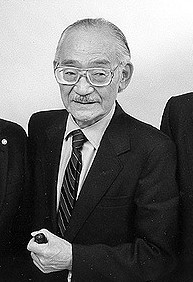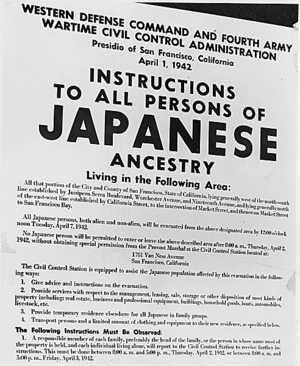Minoru Yasui facts for kids
Quick facts for kids
Minoru Yasui
安井稔 |
|
|---|---|

Yasui
|
|
| Born | October 19, 1916 Hood River, Oregon, United States
|
| Died | November 12, 1986 (aged 70) Denver, Colorado, United States
|
| Resting place | Hood River, Oregon, United States |
| Other names | Min |
| Occupation | Lawyer |
| Known for | Yasui v. United States |
| Spouse(s) | True Shibata |
Minoru Yasui (安井稔, Yasui Minoru, October 19, 1916 – November 12, 1986) was an American lawyer. He was born in Hood River, Oregon. He earned his college and law degrees from the University of Oregon.
After the bombing of Pearl Harbor, he was one of the few Japanese Americans to challenge laws that targeted Japanese Americans and immigrants. His legal case was the first to test if curfews aimed at minority groups were fair. Yasui's case went all the way to the Supreme Court of the United States. The court decided he was guilty of breaking curfew.
After being held in an internment camp during most of World War II, he moved to Denver, Colorado in 1944. In Denver, Yasui got married and became an important community leader. He held leadership roles in groups like the Japanese American Citizens League. In 1986, a federal court finally overturned his old criminal conviction.
In 2015, Senator Mazie K. Hirono suggested Yasui for the Presidential Medal of Freedom. This is the highest award a civilian can get in the United States. On November 16, 2015, President Barack Obama announced that Yasui would receive the medal after his death. His daughter, Lori Yasui, accepted the medal at a White House ceremony on November 24, 2015.
Contents
Minoru Yasui's Early Life and Education
Minoru Yasui was born in Hood River, Oregon, on October 19, 1916. His parents, Shidzuyo and Masuo Yasui, were immigrants from Japan. He was the third of nine children in his fruit-farming family. He finished high school in Hood River in 1933.
When he was eight, he spent a summer in Japan. Later, he attended a Japanese language school in Oregon for three years. After high school, Yasui went to the University of Oregon in Eugene. He earned a bachelor's degree in 1937 and a law degree in 1939.
He was also part of the Army's ROTC program at the university. ROTC trained college students to become military officers. He became a second lieutenant in the Army Reserve in 1937.
After law school, Yasui became the first Japanese-American lawyer allowed to practice in Oregon. He started his law practice in Portland, Oregon in 1939. It was hard for him to find work there. Through his father's connections, he began working for the Japanese government at its office in Chicago, Illinois. He worked as a clerical assistant there.
On December 7, 1941, Japan attacked Pearl Harbor. This brought the United States into World War II. Yasui resigned from his job at the consulate the next day, December 8, 1941.
Minoru Yasui and World War II
After resigning, Yasui returned to Hood River. His father, Masuo Yasui, asked him to come home to report for military duty. Yasui tried nine times to join the United States Army at the Vancouver Barracks. But he was not allowed to take up his officer's role.
On December 13, 1941, the Federal Bureau of Investigation arrested Masuo Yasui. He was seen as an "enemy alien," and his money was frozen. Min Yasui then moved to Portland. He opened a private law practice to help Japanese Americans manage their affairs.
On February 19, 1942, President Franklin D. Roosevelt signed Executive Order 9066. This order allowed the military to create special zones, set curfews, and eventually force Japanese Americans into internment camps during the war.
On March 28, 1942, Yasui purposely broke the military curfew in Portland. He walked around downtown after 11:00 pm. He then went to a police station to get arrested. He wanted to test if the curfew was legal. He first asked an officer to arrest him, but the officer told him to go home. So, he walked into the police station himself.
Later, while out on bail, he learned he had been charged with a crime. When the order came for Japanese people to leave their homes, Yasui told authorities he would not obey. He went to his family's home in Hood River. This broke another law that limited travel for Japanese Americans. Authorities then arrested him in Hood River.
Before his arrest, Yasui had talked to a friend in the FBI. He also spoke with other lawyers. He wanted to challenge the legality of these orders. At his trial, lawyer Earl Bernard defended him. Federal judge James Alger Fee found Yasui guilty. The judge also wrongly said that Yasui, who was born in Oregon, was not a U.S. citizen. Yasui was sentenced to one year in prison and a $5000 fine.
Yasui waited nine months for his appeal. During this time, he was held in the Multnomah County Jail in Portland. He was later sent to the Minidoka War Relocation Center in Idaho. His case eventually went to the Supreme Court. The judges decided that Yasui was indeed a U.S. citizen.
However, on June 21, 1943, in Yasui v. United States, the Supreme Court ruled. They decided that the government could restrict the lives of citizens during wartime. This case was decided along with Hirabayashi v. United States. Yasui was sent back to Judge Fee. The judge removed the fine and said the time Yasui had already served was enough punishment. Yasui was released and moved into the Japanese internment camps.
Minoru Yasui's Later Years and Legacy
In the summer of 1944, Yasui was allowed to leave the internment camp. He worked in Chicago before moving to Denver, Colorado, in September 1944. He passed the bar exam in June 1945. But he could only practice law after appealing to the Colorado Supreme Court.
In November 1946, he married True Shibata, who had also been in an internment camp. They had three daughters: Iris, Holly, and Laurel.
Living in Denver, Yasui became very involved in community work. He served on a committee set up by the mayor. From 1959 to 1983, he worked on the Commission on Community Relations. This group dealt with race relations and other social issues. Yasui was its executive director from 1967 to 1983.
In 1954, he led the Japanese American Citizens League’s (JACL) district. This district covered several states, including Colorado and Wyoming. In 1974, Denver community leaders started the Minoru Yasui Community Service Award. This award is given every year to volunteers in the Denver area.
In 1976, Yasui began working on the JACL’s committee. This committee focused on getting justice for the internment during World War II. He stayed on this committee until 1984 and was its chairman in 1981. In 1984, he also filed a special legal request in federal court in Oregon. He wanted to overturn his old conviction. His conviction was finally overturned by the Oregon federal court in 1986. Minoru Yasui passed away on November 12, 1986. He is buried in his hometown of Hood River.
The City and County of Denver owns an office building named after Yasui. It is called Minoru Yasui Plaza, or the Minoru Yasui Building. A bronze statue of Yasui is in the building's entrance.
See also
- Fred Korematsu
- Gordon Hirabayashi
- List of first minority male lawyers and judges in Oregon
 | Shirley Ann Jackson |
 | Garett Morgan |
 | J. Ernest Wilkins Jr. |
 | Elijah McCoy |


